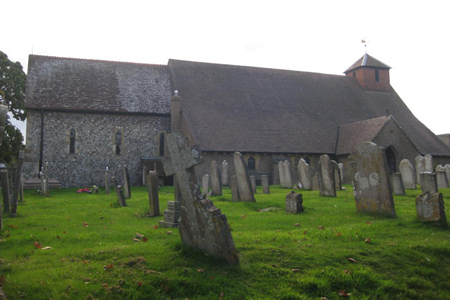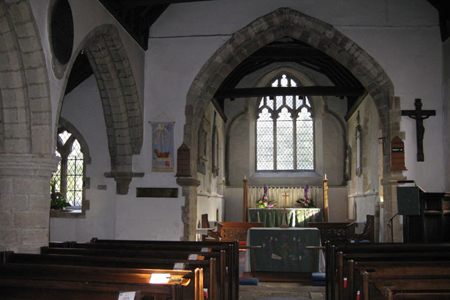| |
 |
 |
 |
| Comment on this report, or find other reports. |
 |
| Our Mystery Worshippers are volunteers who warm church pews for us around the world. If you'd like to become a Mystery Worshipper, start here. |
 |
| Find out how to reproduce this report in your church magazine or website. |
|
|
| 2076: St Andrew's,
Ferring, West Sussex, England |
 |
 |
 |
Mystery Worshipper: Teutonic Knight.
The church:
St
Andrew's, Ferring, West Sussex, England.
Denomination:
Church of England, Diocese
of Chichester.
The building:
One of the oldest churches in Sussex. The current building dates
back to 1120 and the west and south walls remain from that period.
There is only a north aisle, while on the south side a vestry
was added in the 1950s. It has been suggested that the current
porch may originally have been the base of a tower. This might
account for the blocked-up doorway in the east wall, which may
have led to the belfry. Today only a single bell remains, but
records show that there were at least three at one time. The
interior is unusual in that it has been re-ordered to place
the choir stalls nearer the organ. On the south pillar of the
chancel arch there is a bracket for a sermon-timer hourglass,
sadly stolen in the 1970s – a reminder of the times when
sermons lasted hours rather than minutes! Most of the windows
are plain glass, thus giving the sanctuary an airy, light and
spacious atmosphere.
The church:
The prominent notice board outside proudly announces that this
parish church has served the local community since the early
12th century. The parish magazine gives the impression that
it is still very much at the centre of community life. They
entertain close links with the local Baptist church and support
many charities. There is the usual mix of groups catering for
all ages and needs – from a toddlerís group to regular
Bible study.
The neighbourhood:
Ferring remained a hamlet into the early 20th century, when
social mobility and the railways brought visitors to the south
coast and created demand for housing. Today, sadly, Ferring
has fallen victim to the urban sprawl, with houses back to back
almost all the way from Littlehampton in the west to Brighton
in the east, though it claims to maintain a village character.
Just to the north of Ferring lies Highdown Hill with the spectacular
Millerís Tomb, a popular location on the South Downs for dog
owners and walkers. High Salvington Windmill, a restored post
mill in full working order, is also close by.
The cast: The Revd Gary Ingram, priest-in-charge. The readings were done by Boy Scouts while the prayers were read by Brownies. The children also helped with the collection during the offertory hymn and brought all the harvest offerings to the front.
The date & time:
3 October 2010, 9.30 am.
What was the name of the service?
Harvest Festival Family Service.
How full was the building?
Packed. It seems to be a custom here to count the congregation
in as they gather for worship and then announce the number.
It was annouced that the church was "198 at the last count."
A number of pews at the front were reserved for Scouts: Cubs,
Beavers, Brownies and Rainbows. There was a goodly number of
other children present as well.
Did anyone welcome you personally?
The priest was standing on the path outside his church chatting
away to his parishioners. As we came in we were handed a service
sheet and a pew sheet with the usual notices. The stars of the
show were undoubtedly the children; we felt wonderfully unobtrusive.
Was your pew comfortable?
Standard pews, some with a thin cushion covering the length. There were embroidered hassocks as well which were much better padded than the seat cushions.
How would you describe the pre-service
atmosphere?
The place was abuzz. This was obviously a lively and joyous occasion.
What were the exact opening words of the
service?
"In the name of the Father, and of the Son, and of the
Holy Spirit." The "in" was intoned in such a
way into the general buzz ("iiiiiinnn...") that I
was thinking this was going to be an introit sung by the vicar.
It came somewhat as a disappointment that it was no such thing.
What books did the congregation use during the
service?
No books were used during this service; rather, a service sheet
and pew sheet with hymns and notices were employed.
What musical instruments were played?
Keyboard, three acoustic guitars, clarinet, flute, snare drum and cymbals. The band members covered a wide age range, from a young Scout in uniform to an eminent grey-haired lady at the keyboard.
Did anything distract you?
There was no time to get distracted as it moved at a furious pace. The only fly in the ointment was that the audio loop had a few black spots so that the vicar switched off the microphone altogether and proceeded "au naturel."

Was the worship stiff-upper-lip,
happy clappy, or what?
Wacky – as gloriously un-Church-of-England as you are
ever going to find around here. Although the style was not happy
clappy, there was a total absence of the formality that characterises
regular Sunday worship everywhere in the southeastern Anglo-Catholic
stronghold. The only recognisable feature of the ordinary middle-of-the-road
(staid) CofE worship was an off-the-peg "children of the
world" chasuble worn by the priest. He played to the congregation,
thrusting the microphone under their noses to elicit answers
and even casually exchanging a bit of banter with his mother.
Exactly how long was the
sermon?
I completely forgot to time the sermon. It was relatively long, about 20 minutes, but it was still too short, as it did not feel like a sermon, but more like a performance. The whole congregation was in stitches throughout.
On a scale of 1-10, how
good was the preacher?
10 – The vicar is clearly an eccentric character –
in the true sense of the word. All out-going. This was no ordinary
sermon. He roamed up and down the aisle, addressing most of
the talk to all the children present. The adults, I think, were
mostly grateful not to be asked about their favourite foods,
or what they like to have, and whether or not they share, etc.
In a nutshell, what was
the sermon about?
He began by referring to the day's readings: Philippians 4:4-7
("Do not worry about anything"), which means that
God does not want us to worry, or at least not as much as we
do; and John 6:27-35 (Jesus is the Bread of Life), which speaks
of nourishment, of fulfilment in Christ, the reason why we come
to church in the first place. "But that is not the sermon,"
he suddenly declared. Instead, he called several children to
the front and handed them giant letters that spelt the word
"HARVEST." Another child was given the task of arranging
and rearranging the letters into words as directed. Those words
were "vest," "eat" and "have."
God provides everything for us. We should say (with more rearranging
of the letters) "ta" for his "earth". We
should "share," because if we donít, people will "starve."
To God all people are equally valuable, whether life gives them
a bashing or not. To illustrate this, the vicar took a crisp
new £20 note from his wallet and then proceeded to crumple it
up, stamp on it, rub it along the whitewashed wall, and finally
tear it half-way through. After all the battering it got, we
were told it was still worth exactly the same as before.
Which part of the service
was like being in heaven?
The whole atmosphere. Was this really "church?" I
was waiting with baited breath for the £20 note to be torn and
shredded completely to show our wastefulness in the face of
Godís provision.
And which part was like being in... er... the other place?
As the harvest offerings kept coming in we had to sing through the opening hymn ("We plough the fields...," never one of my favourites) twice and start a third time. Surely it was foreseeable that three verses would never suffice on an occasion like this. And the band could do with some better acoustics. Get them a good amplifier!
What happened when you hung around after the service looking lost?
I wish I could have stayed ,as this is clearly a happy place.
As it was, we had to rush and almost barge our way through the
queue waiting to shake the vicarís hand and exchange a few words.
How would you describe the after-service
coffee?
We were advised that the food we would see in the adjacent hall was the harvest lunch and by ticket only (sold out, naturally). However, coffee and biscuits would be available to all as usual.
How would you feel about making this church your regular (where 10 = ecstatic, 0 = terminal)?
8 – This is not my regular style of worship, and in my
parish you would never get away with not celebrating the eucharist
at least twice on any Sunday. However, if I lived closer I would
definitely attend this monthly family service, as we were told
it is always like this.
Did the service make you feel glad to be a
Christian?
I felt like laughing all the way home, and I parted with more
money than I usually would on my Mystery Worshipping tours.
What one thing will you remember about all this in seven days' time?
The abuse given to the £20 note. |
|
|
 |
 |
 |
| We rely on voluntary donations to stay online. If you're a regular visitor to Ship of Fools, please consider supporting us. |
 |
 |
 |
| The Mystery Pilgrim |
 |
| One of our most seasoned reporters makes the Camino pilgrimage to Santiago de Compostela in Spain. Read here. |
 |
 |
 |
| London churches |
 |
| Read reports from 70 London churches, visited by a small army of Mystery Worshippers on one single Sunday. Read here. |
| |
|
|
|
|


